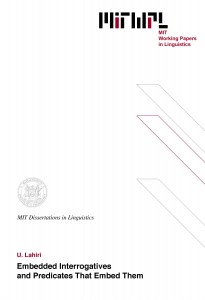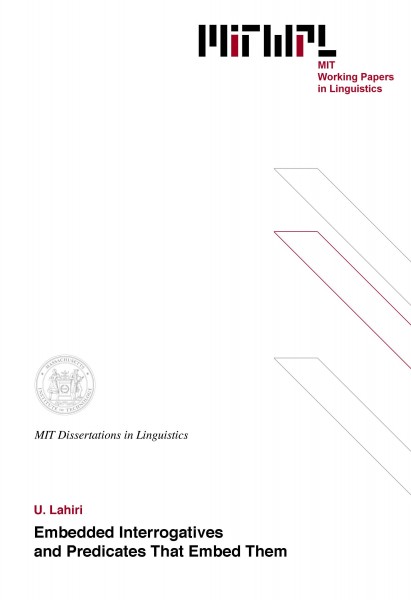Embedded Interrogatives and Predicates That Embed Them
U. Lahiri, 1991
This thesis deals with certain issues in the interpretation of embedded interrogatives, in particular, the role of the notion answer to a question in the interpretation of embedded interrogatives. Chapter 1 discusses a certain view about the interpretation of embedded interrogatives deriving from Hinitikka (1976) and Berman (1991), and raises problems for the view that embedded interrogative complements of predicates like know are open sentences. I discuss the phenomenon of Quantificational Variability, viz., the fact that certain adverbs of quantification restrict the interpretation of structures containing interrogatives embedded under predicates like know in a way they do not for predicates like knows. I argue that the distinction between the two classes of predicates is not between factives and non-factives, but between those predicates that are true of questions and an agent only if their proposition-taking counterpart is true of the agent and some answer to the question. I also argue that certain predicates require their embedded interrogatives to be interpreted as whole answers rather than the way expected of the open sentence view.
In Chapter 2, I examine possible syntactic evidence for the claim that the interrogative complements of predicates like know and predicates like wonder are syntactically distinct, and show that no such evidence is available in English. I examine the case of Spanish which has been proposed to maintain such a distinction, and again show that the relevant distinction is between speech0act and non-speech-act verbs, and so is not directly relevant to the issue of which predicates allow Quantificaitonal Variability.
In Chapter 3, I develop an account of Quantificaitonal Variability that highlights the ways in which answers to questions are relevant in interpeting embedded interrogatives. In order to do this, I first distinguish between two classes of adverbials of quantification, viz., adverbials of frequency and adverbials of quantity and precision, and show that only the latter are relevant to Quantificational Variability. I argue that instantial answers to questions can be viewed as things with a Boolean part-structure, and develop a theory of quantification for atomic Boolean algebras modelled on Higginbotham"s treatment of mass-quantification. Since instantial answers of a particular kind have an atomic Boolean part-structure, this analysis, which is needed independently, can be extended to interrogatives.
Thesis Supervisor: Irene Heim
Title: Associate Professor, Department of Linguistics and Philosophy
Table of Contents
1 Embedded Interrogatives as open sentences 10
1.1 Quantificational Variability in Embedded Interrogatives 10
1.2 Not all factives embed interrogatives 16
1.3 (Some) Nonfactives show QVE 16
1.4 Predicates of Surprise 26
1.5 Predicates of Relevance 33
1.6 Default Universal and Genericity 37
1.7 Embedded Interrogatives and Unselective Binding 39
1.8 Summary of the present work 42
2 Selection of Interrogative Complements 43
2.1 Introduction 43
2.2 S-selection and C-selection 44
2.3 Berman (1990) 52
2.3.1 Essential Features 52
2.3.2 Factivity and the ability to take Interrogative complements 54
2.3.3 Question clauses and propositional wh-clauses 58
2.3.4 Conclusions 67
2.4 Polarity and Embedded Wh-Complements 67
2.5 Groenendijk & Stokhof (1981, 1989) 69
2.6 Spanish Interrogatives and Complement Selection 75
2.6.1 Introduction 76
2.6.2 Predicates of Communication in Spanish 76
2.6.3 Suner (1989) 81
2.6.4 Que as a Quotative marker 85
2.6.5 Conclusions 97
2.7 Conclusions from the Chapter 97
3 Quantificational Variability in Embedded Interrogatives 98
3.1 Introduction 98
3.2 Questions and Answers 99
3.2.1 Hamblin and Karttunen on Questions 99
3.2.2 Partition Semantics 103
3.2.3 Quantifying into Questions 107
3.2.4 Summary 116
3.3 Quantificational Variability 117
3.3.1 Introduction 117
3.3.2 Adverbials of Quantity and Frequency 120
3.3.3 Amount Quantification 130
3.3.4 Questions and Answers in Embedded Contexts 136
3.3.5 Answers and parts of Answers 144
3.4 Conclusions 158
3.5 APPENDIX 159
3.5.1 Modified Karttunen-Hamblin denotations 159
3.5.2 The definability of Partitional denotations from modified
Karttunen-Hamblin (MKH) denotations (in some cases) 159
3.5.3 Partial and Complete Answers 162
3.5.4 Quantification for Atomic Boolean Algebras 164
3.5.5 The Boolean Algebra of Answers 168

